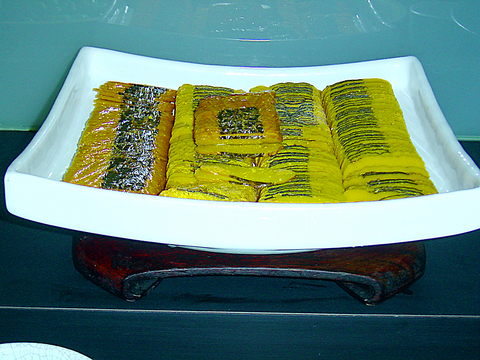Amid the bustling alleys in the hostess bar district near Linsen North Road, it's easy to walk past one of the best vegetarian spots in town because it's concealed on the third floor in a concrete, office-like building on Changchun Road. But the Spring Natural Vegetarian Restaurant is worth the journey through the urban maze, for it provides an array of vegetarian delights that taste just as good as meat, if not better, at reasonable prices.
The interior design of the restaurant makes it look like an upscale version of the organic/vegetarian eateries scattered around narrow alleys in the city. The restaurant has a comfortable and clean looking dining space with its beige table sets and charcoal gray stone floor. Even though the restaurant has eight private rooms for reservations and luxurious set meals, its main attraction is the buffet section which features a broad selection of salad, cold appetizers, soups, main courses, drinks and desserts.
The various greens on the salad plates are either organic vegetables imported from abroad, or locally grown vegetables. Serving environmentally friendly food means the eatery naturally has higher costs, but this pays off with the quality of the food. The salads are fresh, crispy and juicy. You can get a healthy feeling just by looking at it. For appetizers, you can get peculiar looking dishes such as nutrition-rich coral grass (珊瑚草) and the valuable plant tian shan hsueh lian (天山雪蓮) seasoned with honey and sweet osmanthus sauce.

PHOTO: HO YI, TAIPEI TIMES
The selection of soups and drinks should satisfy the most health-conscious customer, who can tuck into chlorophyll and wheat grass juice and Chinese herbal soups.
As for the main courses, signature dishes include kung-pao monkey head mushroom (宮保猴頭菇) and Chinese toon tree leaves Tofu (香椿豆腐). Both are ingenious creations by the chefs who blends fresh ingredients with herbal seasoning. The resulting taste is simply divine. You can also choose a vegetable and ask the chef to cook it for you on the spot.
The service is attentive and the owner Zhu Xiu-qing (朱秀卿) is often found talking to the customers about the food. Zhu told me instead of tap water, they use purified water produced by US-patented purifiers to clean all the food and cook the noodles and rice.
Business at Spring Natural is good even on the weekdays, so it is recommended to make a reservations beforehand. Otherwise, you'll have to wait outside for a long time to get a seat.

Most heroes are remembered for the battles they fought. Taiwan’s Black Bat Squadron is remembered for flying into Chinese airspace 838 times between 1953 and 1967, and for the 148 men whose sacrifice bought the intelligence that kept Taiwan secure. Two-thirds of the squadron died carrying out missions most people wouldn’t learn about for another 40 years. The squadron lost 15 aircraft and 148 crew members over those 14 years, making it the deadliest unit in Taiwan’s military history by casualty rate. They flew at night, often at low altitudes, straight into some of the most heavily defended airspace in Asia.

Beijing’s ironic, abusive tantrums aimed at Japan since Japanese Prime Minister Sanae Takaichi publicly stated that a Taiwan contingency would be an existential crisis for Japan, have revealed for all the world to see that the People’s Republic of China (PRC) lusts after Okinawa. We all owe Takaichi a debt of thanks for getting the PRC to make that public. The PRC and its netizens, taking their cue from the Chinese Communist Party (CCP), are presenting Okinawa by mirroring the claims about Taiwan. Official PRC propaganda organs began to wax lyrical about Okinawa’s “unsettled status” beginning last month. A Global

Taiwan’s democracy is at risk. Be very alarmed. This is not a drill. The current constitutional crisis progressed slowly, then suddenly. Political tensions, partisan hostility and emotions are all running high right when cool heads and calm negotiation are most needed. Oxford defines brinkmanship as: “The art or practice of pursuing a dangerous policy to the limits of safety before stopping, especially in politics.” It says the term comes from a quote from a 1956 Cold War interview with then-American Secretary of State John Foster Dulles, when he said: ‘The ability to get to the verge without getting into the war is

Like much in the world today, theater has experienced major disruptions over the six years since COVID-19. The pandemic, the war in Ukraine and social media have created a new normal of geopolitical and information uncertainty, and the performing arts are not immune to these effects. “Ten years ago people wanted to come to the theater to engage with important issues, but now the Internet allows them to engage with those issues powerfully and immediately,” said Faith Tan, programming director of the Esplanade in Singapore, speaking last week in Japan. “One reaction to unpredictability has been a renewed emphasis on